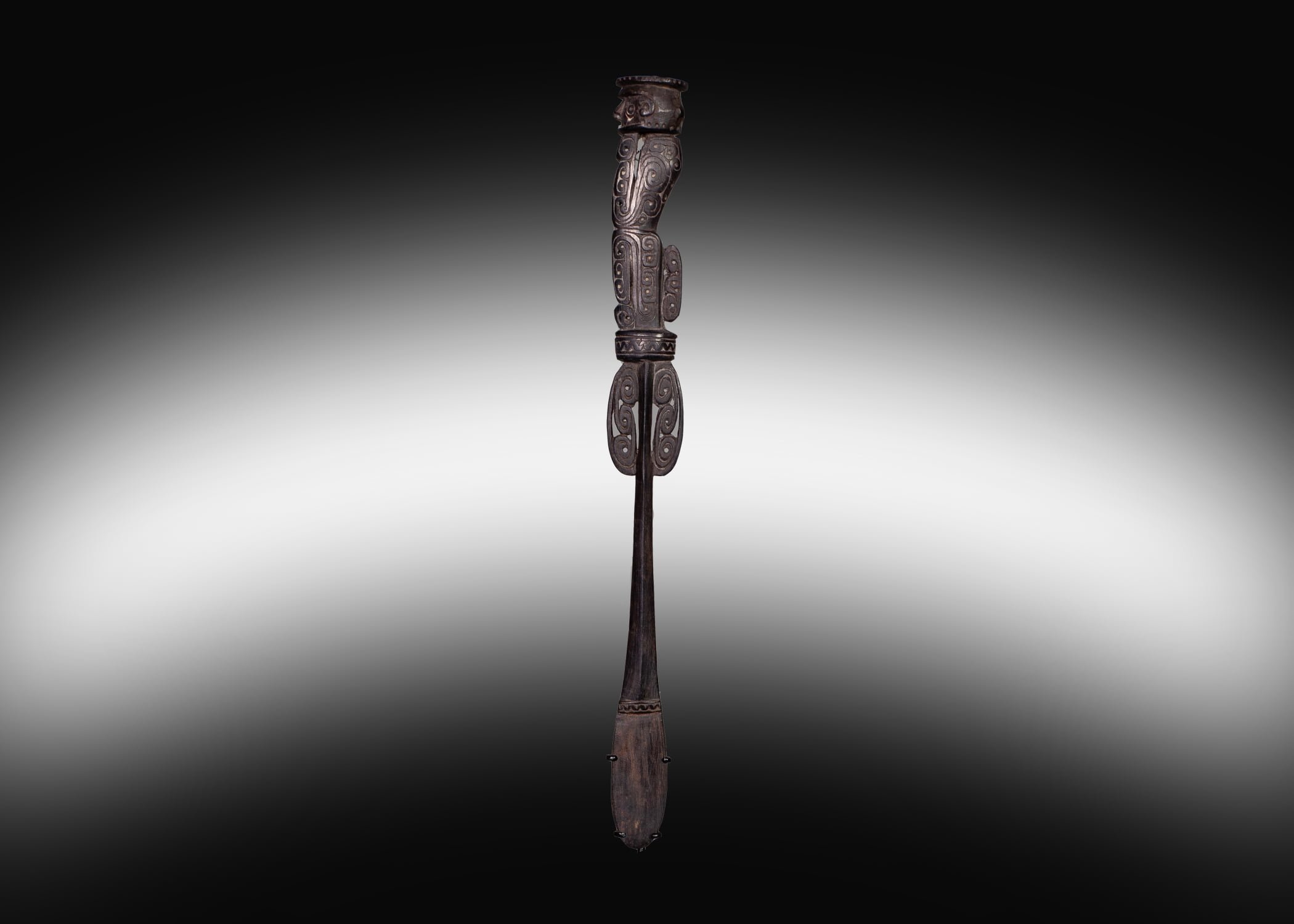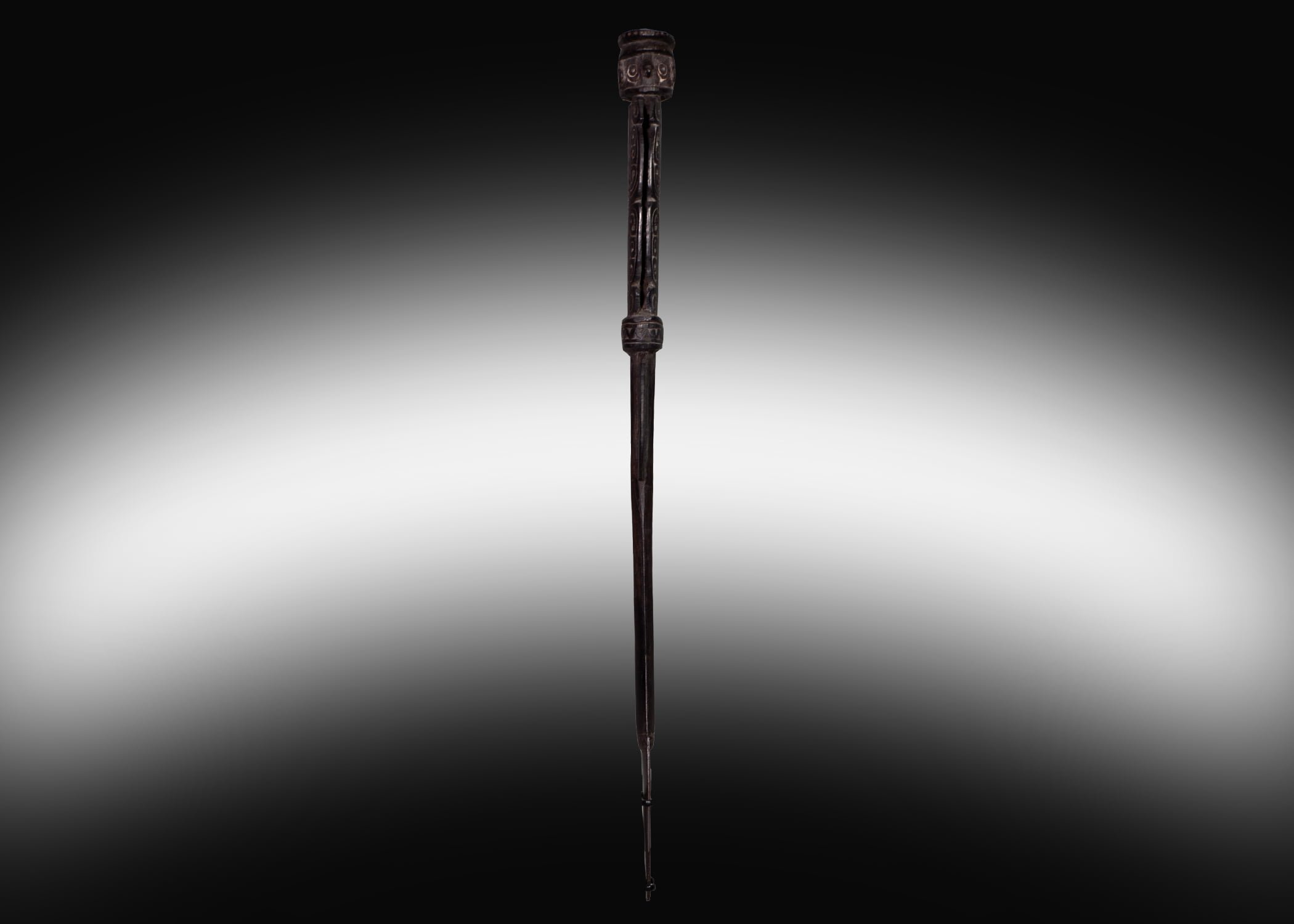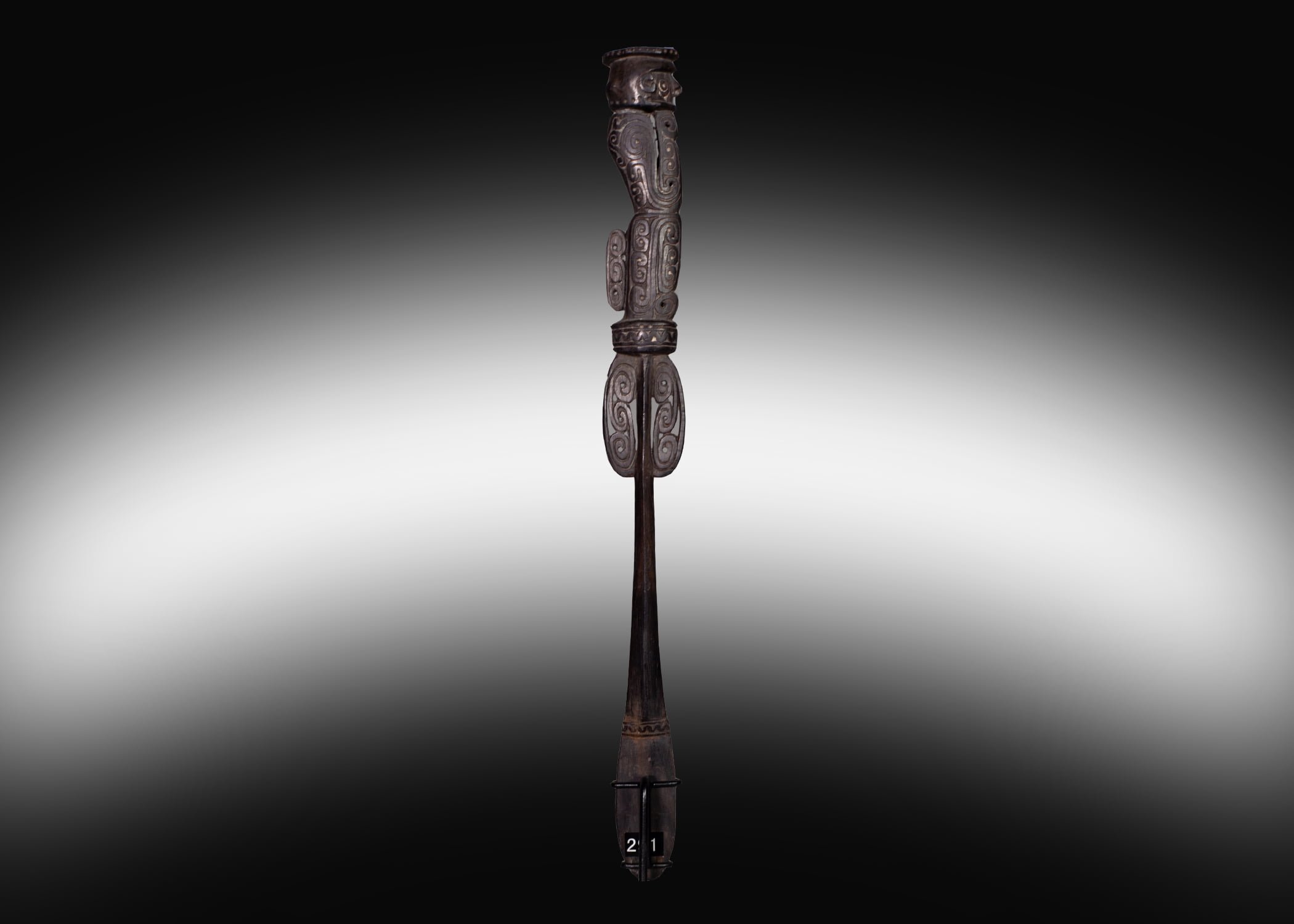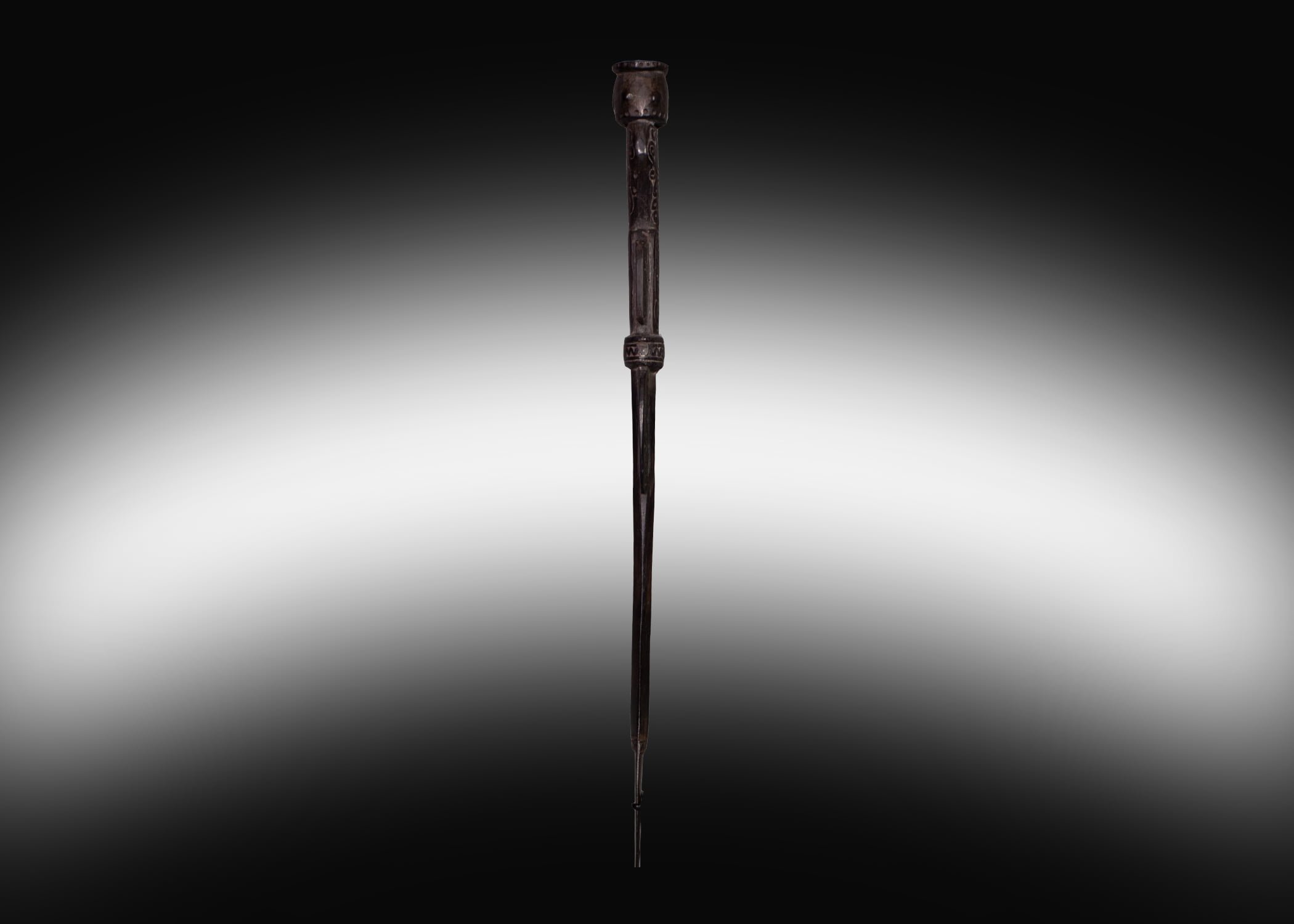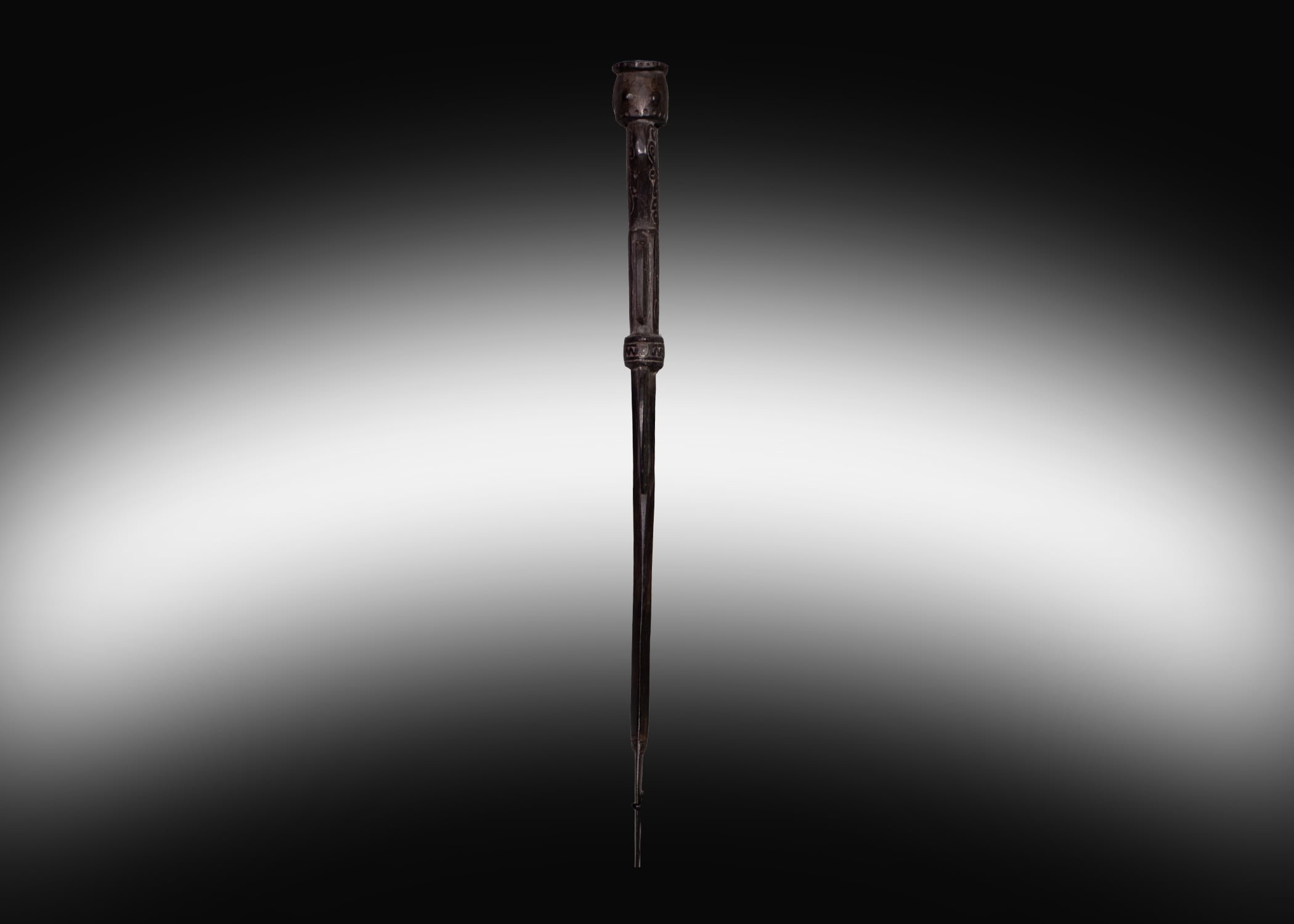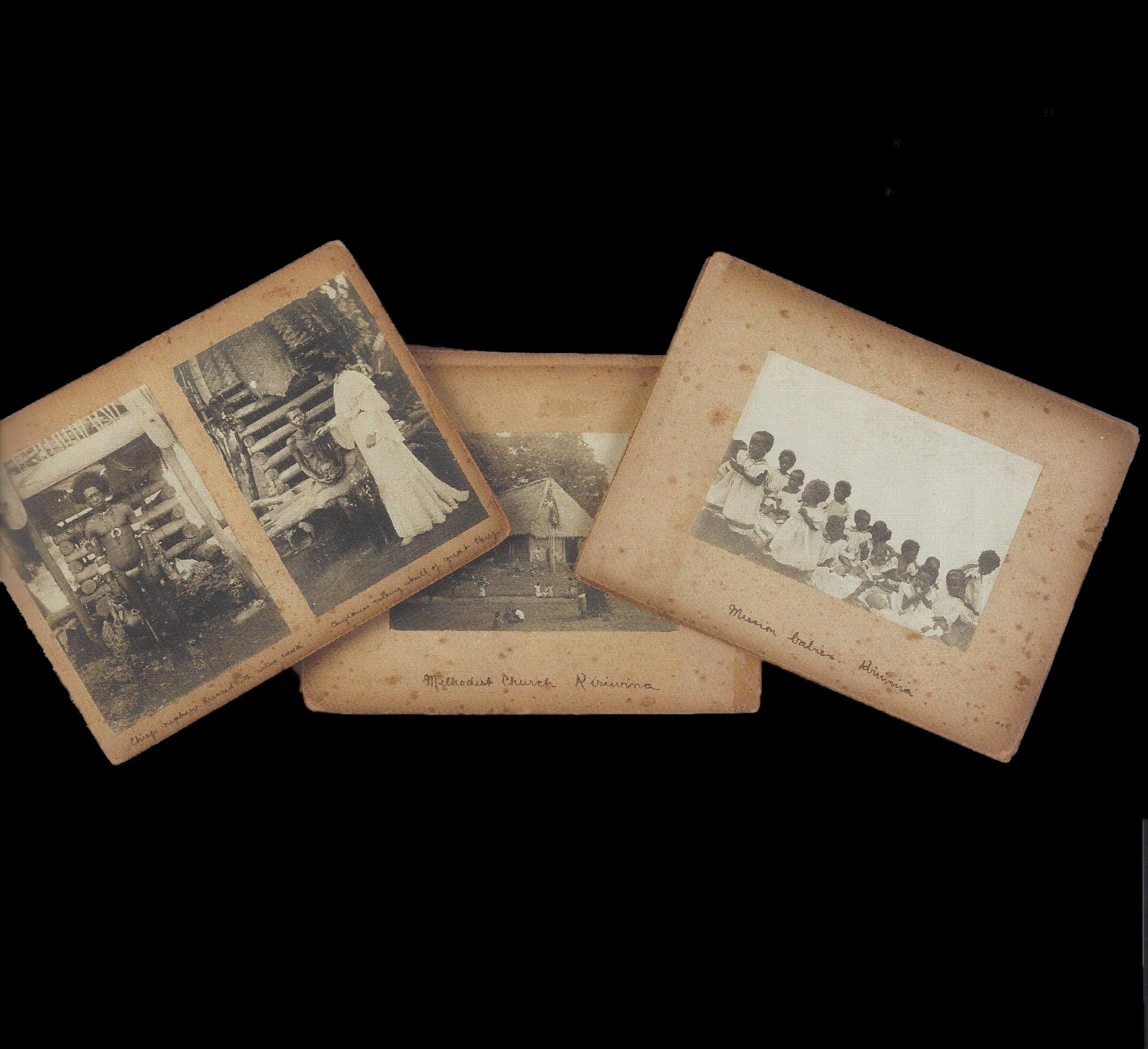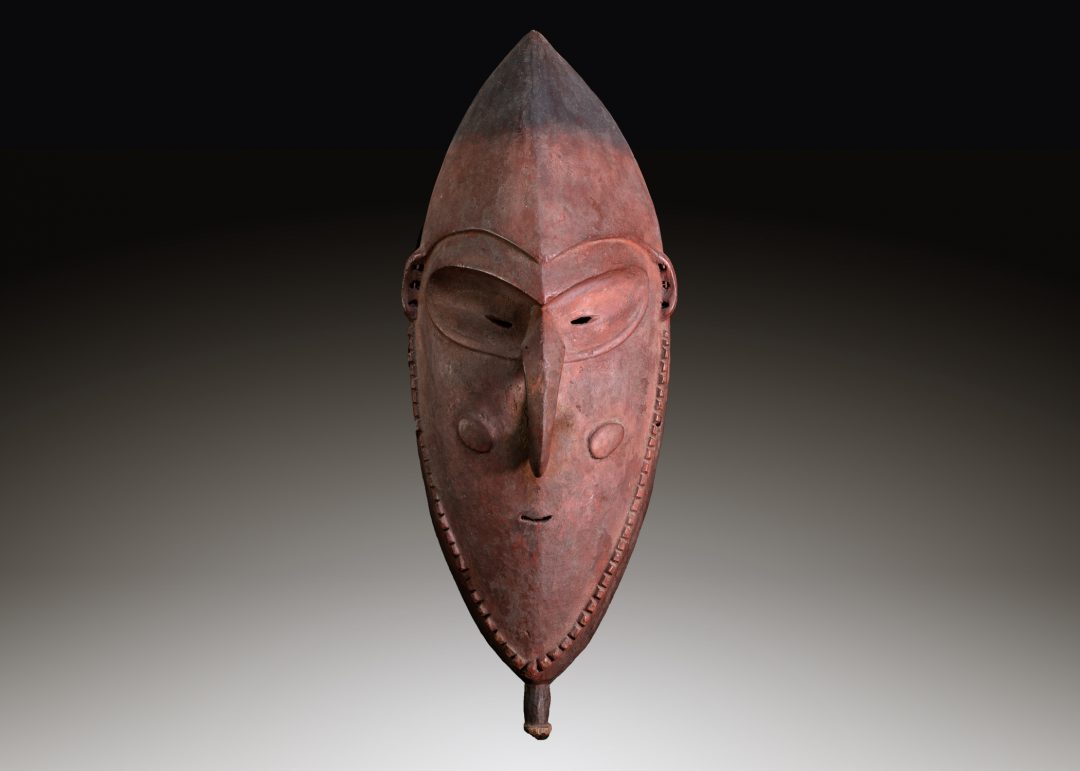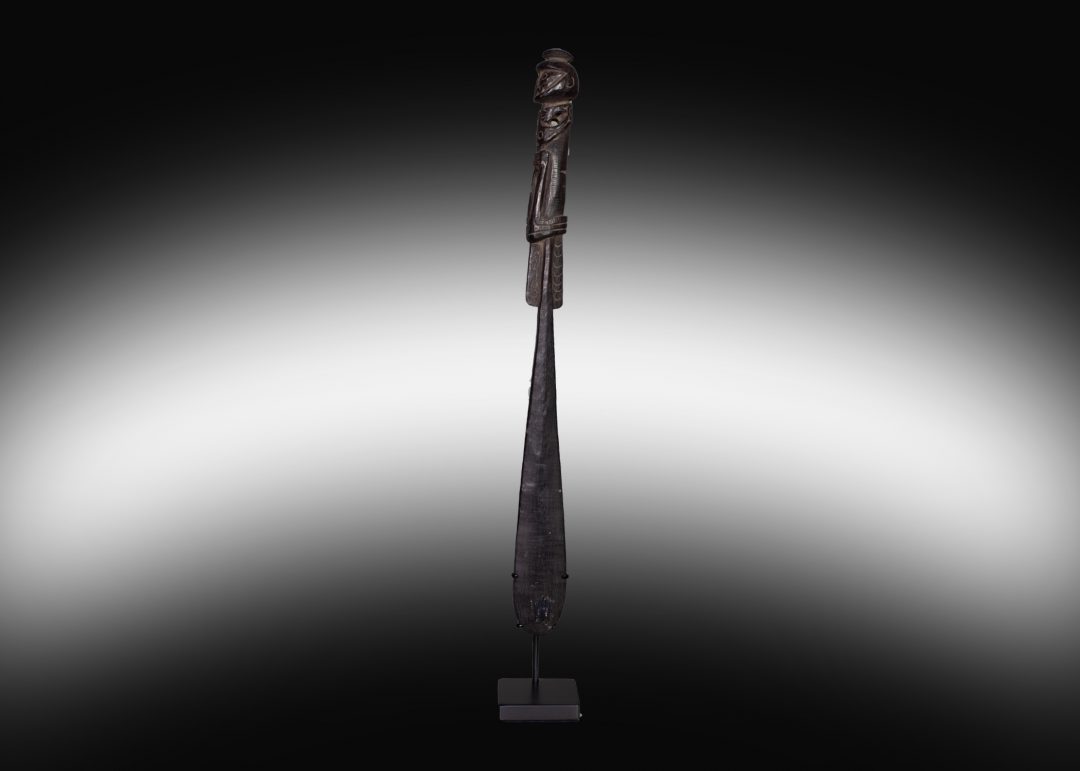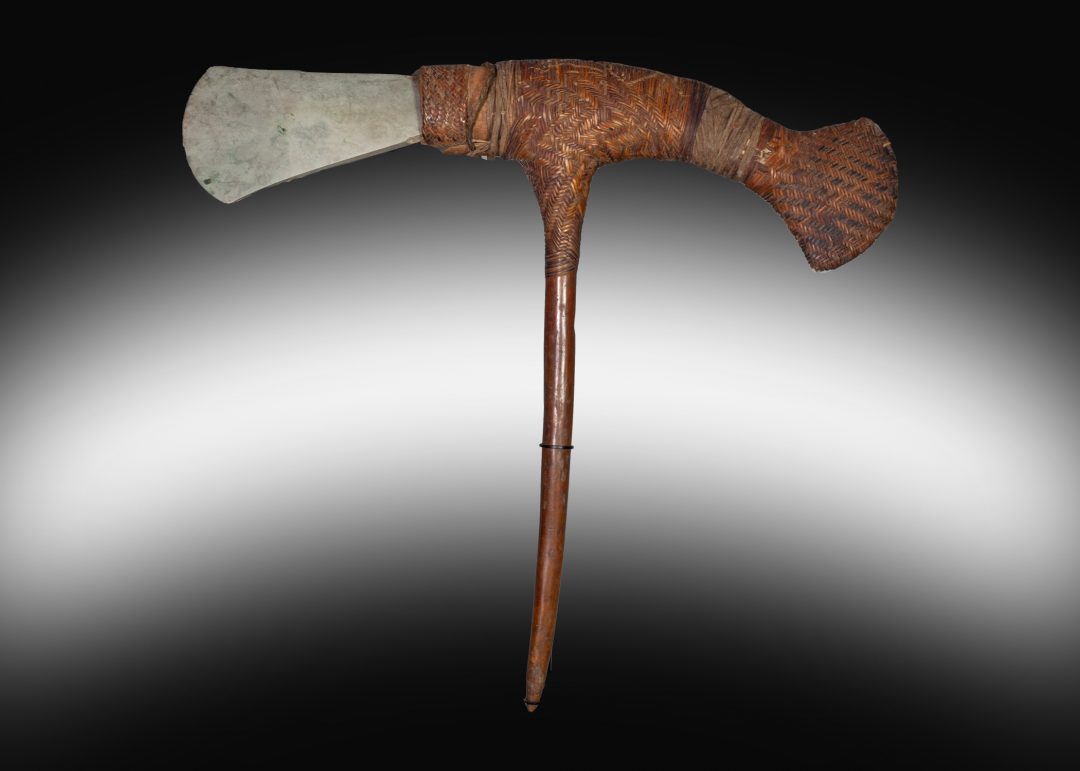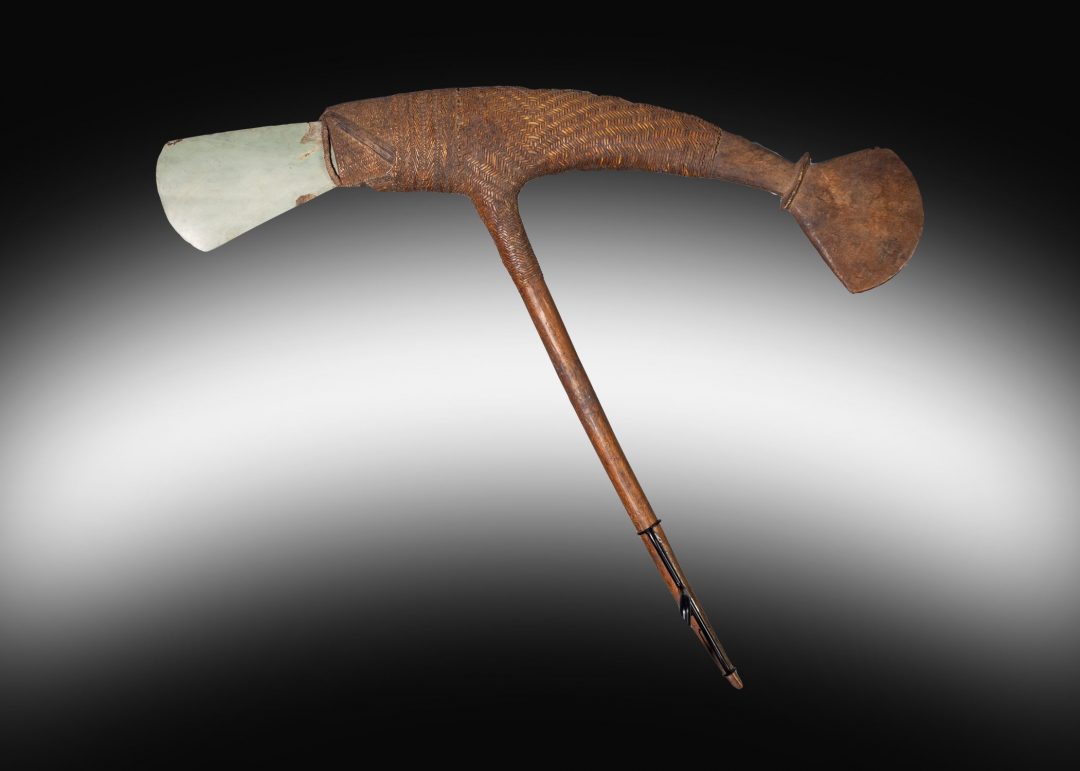Massim Figurative Spatula Circa 19th early 20th century
-
TitleMassim Figurative Spatula Pre 1842
-
LocationMassim region
-
DatePre 1842
- Size30cm (L)
-
Price$2,800.00
This is one of two spatulas from Rev Waterhouse’s family collection. Rev Waterhouse was the general superintendent of the Wesleyan Mission in Australiasia and Polynesia. Although originally informed that this was collected by Rev Waterhouse it is most likely collected by one of his descendants, some of whom also chose to serve in his ministry. As part of the Waterhouse collection was a photo album of the Methodist Mission at Kiriwina, Trobriand Islands circa 1905 which showed an ethnographic insight into island life and culture with images. This spatula is most likely from this period 1904-12. It is one of the most finely detailed spatulas I have handled. Starting from the top, the ‘cap’ has small incised holes around the top, the nose is pierced, with ears in relief and remnants of lime in the eyes. The body is highly stylized with scroll work. Note also the legs and arms are separate with a deeply incised groove. At the blade end of the spatula there is also a very elegant zig zag band of carving.
This spatula includes a custom metal stand.
Professor Peter McCabe, curious about the Rev Waterhouse provenance, investigated the provenance further and has provided a more likely senario on its collection history.
The first recorded mission in the Trobriands appears to have started in 1894 with a Methodist mission in Kiriwina: the Rev Samuel Fellows was apparently the first European to settle in the Trobriands . There were only short visits made by explorers, pearlers, merchants etc before that. Fellows was a collector of artefacts, and left the Trobriands in 1901.
From late 1897 the mission had Methodist sisters who staffed the station and were involved in teaching and nursing. These women were initially from the City of Churches and were supported by the South Australian Ladies’ Auxiliary, which donated a replica of a ‘comfortably furnished suburban house’ for them, that was reassembled on the island and named the ‘Adelaide Sisters’ Home’. One of those women was Edith Lloyd who brought back to Australia several carved items. Edith Lloyd returned to Australia on furlough in April 1902 but was prevented by ill-health from returning to the Trobriands. It was only after efforts failed to secure a successor in South Australia, that “it was reluctantly decided to secure a worker to represent the Methodist Ladies Foreign Missionary Auxiliary from one of the other States, and, as a result, Sister Bessie (Miss Corfield), from Nowra, N.S.W., was sent to Kiriwina….in September 1904”.
Bessie Corfield remained in the Trobriands (with periods of furlough in Australia due to health problems) until 1913. On 11 April 1914 she married Rev. Percy M. Waterhouse, a great grandson of Rev. John Waterhouse. Percy Waterhouse was originally from Glenelg and in 1914 was a minister at Milton (next to Mollymook). However, he had previously been a minister in Papua for a short time (1912-13) and that is presumably where Bessie and Percy met.
The collection of Bessie’s material (including diaries and correspondence) became part of the Waterhouse family collection that was put up for sale at Mossgreen’s “Rev. John Waterhouse and family” auction of December 2017 (a few days before the collapse of the auction house) which included this spatula.
This spatula is most likely from this period 1904-12.
Rev John Waterhouse (1789-1842 )
from Colonial Times (Hobart) 5th April 1842
We have the melancholy task of recording the decease of the Rev. John Waterhouse, on Wednesday last, at his residence in Campbell-street, after a long illness occasioned by a severe cold caught at Ross, through remaining and preaching in that Settlement in wet clothes for several hours, and his constitution having been previously affected by the extreme hot weather he had encountered on a late Missionary visit to the Friendly and Fejee Islands. Mr. Waterhouse was General Superintendent of the Wesleyan Church and Missions in Australasia and Polynesia, and from his conduct and general deportment he was well qualified for the successful discharge of his duty. His death will be a great loss to the Wesleyan Church, but more especially in this Colony, where a late Chairman possessing too much talent without consistency and prudence had occasioned a rupture and certain feelings in a Congregation and Society the most peaceful and prosperous in the whole connection, that has not yet been thoroughly allayed, and which the suavity of manner and Christian meekness of Mr. Waterhouse was eminently calculated to effect. We learn that his recollection continued to the last; and his death-bed admonitions, advices, example, and triumph over the last enemy of man, through an undeviating faith in the Captain of his Salvation, to his family and friends will be ever remembered and appreciated. We suppose the Rev. Mr. Turner, the Senior Wesleyan Preacher in these Colonies, will take his place until a new appointment from home be officially announced.
This is one of two spatulas from Rev Waterhouse’s family collection. Rev Waterhouse was the general superintendent of the Wesleyan Mission in Australiasia and Polynesia. Although originally informed that this was collected by Rev Waterhouse it is most likely collected by one of his descendants, some of whom also chose to serve in his ministry. As part of the Waterhouse collection was a photo album of the Methodist Mission at Kiriwina, Trobriand Islands circa 1905 which showed an ethnographic insight into island life and culture with images. This spatula is most likely from this period 1904-12. It is one of the most finely detailed spatulas I have handled. Starting from the top, the ‘cap’ has small incised holes around the top, the nose is pierced, with ears in relief and remnants of lime in the eyes. The body is highly stylized with scroll work. Note also the legs and arms are separate with a deeply incised groove. At the blade end of the spatula there is also a very elegant zig zag band of carving.
This spatula includes a custom metal stand.
Professor Peter McCabe, curious about the Rev Waterhouse provenance, investigated the provenance further and has provided a more likely senario on its collection history.
The first recorded mission in the Trobriands appears to have started in 1894 with a Methodist mission in Kiriwina: the Rev Samuel Fellows was apparently the first European to settle in the Trobriands . There were only short visits made by explorers, pearlers, merchants etc before that. Fellows was a collector of artefacts, and left the Trobriands in 1901.
From late 1897 the mission had Methodist sisters who staffed the station and were involved in teaching and nursing. These women were initially from the City of Churches and were supported by the South Australian Ladies’ Auxiliary, which donated a replica of a ‘comfortably furnished suburban house’ for them, that was reassembled on the island and named the ‘Adelaide Sisters’ Home’. One of those women was Edith Lloyd who brought back to Australia several carved items. Edith Lloyd returned to Australia on furlough in April 1902 but was prevented by ill-health from returning to the Trobriands. It was only after efforts failed to secure a successor in South Australia, that “it was reluctantly decided to secure a worker to represent the Methodist Ladies Foreign Missionary Auxiliary from one of the other States, and, as a result, Sister Bessie (Miss Corfield), from Nowra, N.S.W., was sent to Kiriwina….in September 1904”.
Bessie Corfield remained in the Trobriands (with periods of furlough in Australia due to health problems) until 1913. On 11 April 1914 she married Rev. Percy M. Waterhouse, a great grandson of Rev. John Waterhouse. Percy Waterhouse was originally from Glenelg and in 1914 was a minister at Milton (next to Mollymook). However, he had previously been a minister in Papua for a short time (1912-13) and that is presumably where Bessie and Percy met.
The collection of Bessie’s material (including diaries and correspondence) became part of the Waterhouse family collection that was put up for sale at Mossgreen’s “Rev. John Waterhouse and family” auction of December 2017 (a few days before the collapse of the auction house) which included this spatula.
This spatula is most likely from this period 1904-12.
Rev John Waterhouse (1789-1842 )
from Colonial Times (Hobart) 5th April 1842
We have the melancholy task of recording the decease of the Rev. John Waterhouse, on Wednesday last, at his residence in Campbell-street, after a long illness occasioned by a severe cold caught at Ross, through remaining and preaching in that Settlement in wet clothes for several hours, and his constitution having been previously affected by the extreme hot weather he had encountered on a late Missionary visit to the Friendly and Fejee Islands. Mr. Waterhouse was General Superintendent of the Wesleyan Church and Missions in Australasia and Polynesia, and from his conduct and general deportment he was well qualified for the successful discharge of his duty. His death will be a great loss to the Wesleyan Church, but more especially in this Colony, where a late Chairman possessing too much talent without consistency and prudence had occasioned a rupture and certain feelings in a Congregation and Society the most peaceful and prosperous in the whole connection, that has not yet been thoroughly allayed, and which the suavity of manner and Christian meekness of Mr. Waterhouse was eminently calculated to effect. We learn that his recollection continued to the last; and his death-bed admonitions, advices, example, and triumph over the last enemy of man, through an undeviating faith in the Captain of his Salvation, to his family and friends will be ever remembered and appreciated. We suppose the Rev. Mr. Turner, the Senior Wesleyan Preacher in these Colonies, will take his place until a new appointment from home be officially announced.
